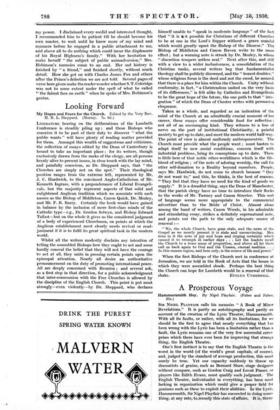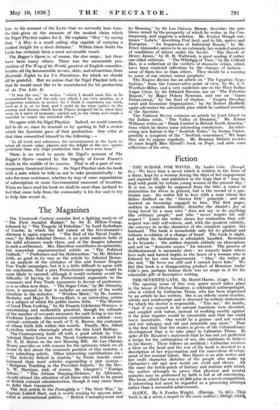A Prosperous Voyage
Hammersmith Hoy. By Nigel Playfair. (Faber and Faber.
Sia NIGEL PLAYFAIR calls his memoirs "A Book of Minor Revelations." It is partly an autobiography and partly an account of the creation of the Lyric Theatre, Hammersmith. With all its faults, or rather, with all its limitations, for we should be the first to agree that nearly everything that las been wrong with the Lyric has been a limitation rather than a fault, the Lyric remains one of the very few successful enter- prises which there have ever been for improving that strange thing, the English Theatre.
One's first instinct is to say that the English Theatre is the Worst in the world (of the world's great capitals, of course), and, judged by the standard of average production, this must surely be true. Yet our capacity suddenly to throw up dramatists of genius, such as Bernard Shaw, stage designers without compare, such as Gordon Craig and Lovat Fraser, or players like Edith Evans, must qualify such judgment. The English Theatre, individualist in everything, has been most lacking in organization which could give a proper field for geniuses such as these to exploit their abilities. In the Lyric, Hammersmith, Sir Nigel Playfair has succeeded in doing some- thing, at any rate, to_remedy this state otaffairs. It is, there-
fore, to his account of the -Lyric that we naturally here turn. Its title gives us the measure of the modest claim which Sir Nigel Playfair makes for.it. -He explains "Hoy" by saying that "A Hoy is a small sailing ship capable of carrying a modest freight for a,short distance." Within these limits the Lyric has certainly been a most serviceable vessel.
The Beggar's Opera is, of course, the star cargo ; but there have been many others. There was the memorable pro- duction of The Way of the World, greatest of English comedies, besides all the innumerable revues, skits, and attractions, from Riverside Nights to La. Vie Parisienne, for which we should
all be grateful. But we notice that Sir Nigel Playfair tells us
that he would most like to be remembered for his production of As You Like D.
"It was the one," he writes, "which I should most like to be remembered by, and the only one which I am very anxious, in a prosperous moment, to revive, for I think it represents my work, such as it is, at its beat, and I could do far more justice to the scenery and dresses which Lovat Fraser designed for it, since they were, in a spirit of economy, carried out in too cheap and rough a material to create the intended effect."
We agree with Sir Nigel Playfair. Indeed, we could scarcely fail to do so, since he reminds us by quoting in full a review which the Spectator gave of that production. Our critic at
that time committed himself to the following :—
" In all truth and soberness, the entertainment at the Lyric is. taken all round—play, players and the delight of the eye—nearer perfection than any stage production that I have ever seen."
There is no need to quote Sir Nigel's account of The Beggar's Opera—marred by the tragedy of Lovat Fraser's
death in the middle of its success. That is all a part of con- temporary theatrical history. Sir Nigel Playfair ends his book with a note which he tells us not to take pessimistically : he asks for some assistance, whether by way of some organization of subscription or some Governmental easement of taxation. When we have read his book we shall be more than inclined to feel that some help from the community is his due and to try to help him secure it.







































 Previous page
Previous page